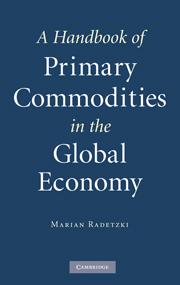Book contents
- Frontmatter
- Contents
- List of figures
- List of tables
- Acknowledgments
- Introduction
- 1 The historical framework
- 2 The geography of commodity production and trade
- 3 Comparative advantage and the trade policy distortions
- 4 Price formation and price trends in commodities
- 5 The commodity exchanges, commodity investments, and speculation
- 6 The economics of exhaustible resource depletion
- 7 Fears of, and measures to assure, supply security
- 8 Producer cartels in international commodity markets
- 9 Public ownership in primary commodity production
- 10 The monoeconomies: issues raised by heavy dependence on commodity production and exports
- References
- Index
6 - The economics of exhaustible resource depletion
Published online by Cambridge University Press: 23 June 2009
- Frontmatter
- Contents
- List of figures
- List of tables
- Acknowledgments
- Introduction
- 1 The historical framework
- 2 The geography of commodity production and trade
- 3 Comparative advantage and the trade policy distortions
- 4 Price formation and price trends in commodities
- 5 The commodity exchanges, commodity investments, and speculation
- 6 The economics of exhaustible resource depletion
- 7 Fears of, and measures to assure, supply security
- 8 Producer cartels in international commodity markets
- 9 Public ownership in primary commodity production
- 10 The monoeconomies: issues raised by heavy dependence on commodity production and exports
- References
- Index
Summary
The fears of depletion of the physical resources upon which human societies and their cultures build are as old as humanity itself. Maurice and Smithson (1984) provide examples from antiquity to modern times, so Thomas Malthus (1798) was by no way the first to express concerns about the inadequacies of the physical environment for human needs. Malthus, however, has had many followers. The dire predictions of the Club of Rome (Meadows et al., 1972) and of the Association for the Study of Peak Oil (Campbell, 1997) are but two of the more recent influential examples of this strand of thought. The messages of an impending depletion of this or the other component of the human physical environment are usually accentuated and enjoy a wider hearing during periods of boom, when expansion in usage gathers pace and prices rise. Until recent times, however, the pessimistic messages have all proved wrong (Simon, 1996). The real prices of virtually all resource products traded in competitive markets have experienced a long-run decline (see chapter 4), while the physical environment has tended to improve, not deteriorate, in consequence of economic growth (Lomborg, 2001; Radetzki, 2001).
This chapter treats a subset of the above concerns. It is devoted exclusively to exhaustible resources, comprising metals, minerals, and fossil fuels. Outputs from agriculture, forestry, and aquaculture, all being renewable, are not part of the deliberations. Furthermore, as appears from the chapter's title, I deal predominantly, though not exclusively, with depletion in an economic, not in a physical sense.
- Type
- Chapter
- Information
- A Handbook of Primary Commodities in the Global Economy , pp. 111 - 125Publisher: Cambridge University PressPrint publication year: 2008



